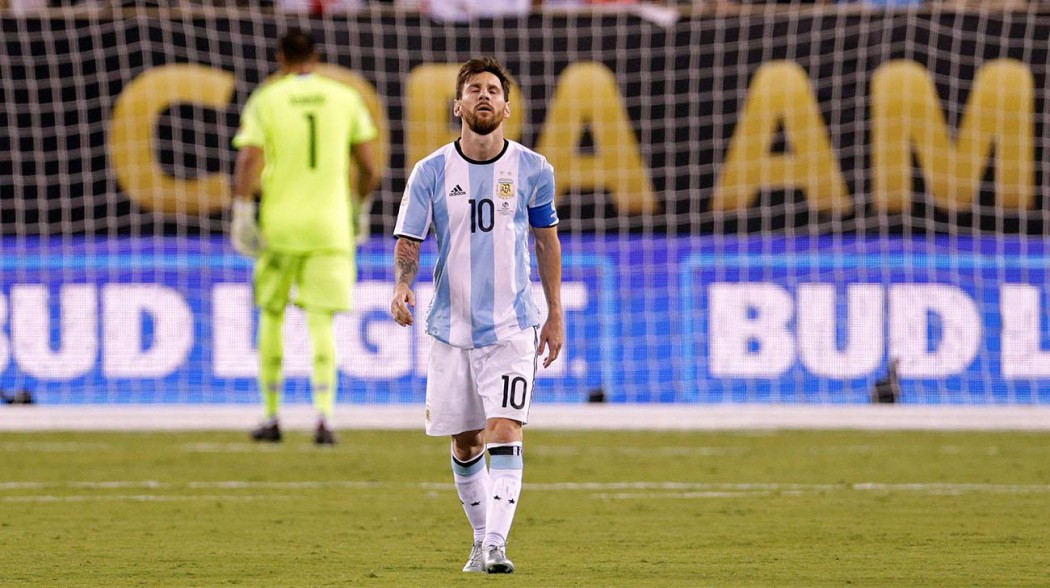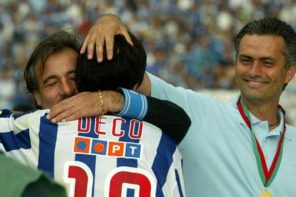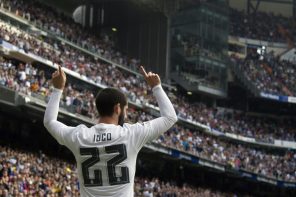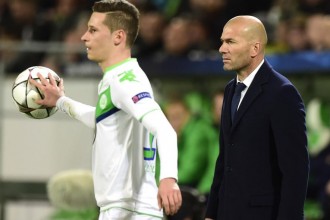Argentina is divided, apparently. As the penalty flew over the bar, tearing the night sky in half, so the divide split further. There are those who still believe in Lionel Messi, and those who feel fulfilled by his decision to quit the national side – vindicated in their opinion that the playmaker would never live up to the feats of their one and only D10s.
If Messi felt unloved and alone with the burden to deliver the country’s first title since 1993 before the Copa America Centenario, the feeling dramatically intensified in the wake of defeat.
In the dressing room I thought that this is the end for me with the national team,” said a disconsolate Messi.
It’s not for me. I tried so hard to be champion with Argentina. Now I am leaving without having managed it.
Whether crowned as a champion or not, Messi should be celebrated unconditionally by Argentina. But everything changed that day in 1986 when Diego Maradona lifted a pass into the path of Jorge Burrichaga, who rushed towards goal and applied an 84th minute finish. The goal not only secured World Cup number two for the country, but cemented Maradona as their demi-god who non shall ever surpass.
Diego dominated the tournament like no individual had done before – almost single-handedly driving the team to victory with his goals (5), assists (4), and awe-inspiring presence on the pitch.
For all of his genius and decisiveness however, he was not alone in attaining the final victory which served as his coronation. Diego didn’t score in the 3-2 win over West Germany – he did assist the winning goal, but it was only classed as such because his visionary pass was converted by Burrichaga.
But what if that finishing touch hadn’t been applied? What if striker Jorge Valdano – who weighed in with four goals, including one in the same final – hadn’t applied his finishing touches in that tournament? And what if Sergio Aguero and Gonzalo Higuain in the two recent Copa America finals, or Rodrigo Palacio and Higuain again in the 2014 World Cup final had converted their numerous and extremely presentable chances in tournaments which Messi had starred throughout?
The burden and weight of the nation’s expectations should not be on Messi’s shoulders alone, because as the above instances demonstrate, even the greatest have had help when it matters most. It’s a fine line between being hailed as a genius or castigated as a failure. Unfairly, Messi has been made scapegoat for the country’s inability to lift silverware.
But there is another difference that goes far beyond how the two Argentine Numbers 10s are perceived by their countrymen on the whole. If the Argentina ‘86 side hadn’t have landed the World Cup, would Maradona still have been so adored by the nation? Probably, as the late writer Eduardo Galeano beautifully alluded about with a gods v mortals paradigm:
Diego Armando Maradona was adored not only for his prodigious talent, but also because he was a dirty god, a sinner, the most human of the gods.
Anyone could see in him a living synthesis of human weakness, or at the very least male weakness: adulterer, drunk, cheater, liar, braggart, irresponsible. But the gods do not just fade away, as human as they may be.
A potent mixture of the divine with the earthly was heavily seen in another fantasista, Roberto Baggio, though his ‘weaknesses’ – fragility and great humility – were very different to those of Maradona.
It has been noted on many occasions that Baggio’s effect on Italy’s 1994 World Cup campaign was akin to Maradona in ’86, barring the final result. Had things gone differently for the Divine Ponytail in the final’s penalty shoot-out, it would have been classed as a one-man tournament victory that no other player had produced since Diego.
Unlike Messi’s decision after his fateful miss, Baggio had his international retirement effectively decided for him by Arrigo Sacchi after his penalty, robbing him of playing any further for his country during his peak ages. Like Baggio did however, Messi can still come back to atone for the so called ‘sins’ and wash away much of his suffering, as he did by returning as Italy’s saviour in a time of need in the opening game of the very next World Cup, by assisting one and scoring a late equaliser – a penalty.
The trials of Baggio has shown that, after torture, redemption can be achieved by the greatest Number 10s, but he is not, and should not, be alone in seeking this when with Argentina. Maradona himself has stated he’ll be standing by his former pupil, insisting:
Messi was abandoned and I don’t want to abandon him. That’s why I want to talk to him, to fight against all those who abandoned him. Messi must carry on in the national team…because he still has a lot to give, because he’ll get to [the 2018 World Cup hosts] Russia with chances of being world champion.
He has to lean more on the lads who can help him take the team forward and less on those who say he should leave.
Others, like Boca Juniors playmaking legend Juan-Roman Riquelme, believed Messi stood alone even before his ill-fated spot-kick sailed into the night sky. “Because Messi plays alone,” the former Boca playmaker gave as his reason why the country has failed to lift a trophy during the Messi years, before continuing:
He is the best in the world. We must look after him. He is Argentine, and I have no doubts that if he is in good form, Argentina will be very close to winning. There is nobody like Messi, not here, or anywhere.
I am Argentine and I had the good fortune to play with him. He is a marvel. A player who has won so much, who keeps competing every year to win titles, never settles for what he has. People should enjoy him.
Enjoy him they should; as they do at club level. It’s somewhat ironic that the one place Messi has undoubtedly succeeded in surpassing Diego is the place where he endured trouble: Barcelona.
Irony is also evident as it was on USA soil that Maradona played his last ever game for Argentina, as has Messi…for now. The hope is that this eerie coincidence does not go down in the history books as actual fact, and Messi returns for his country – because he’s not alone.







